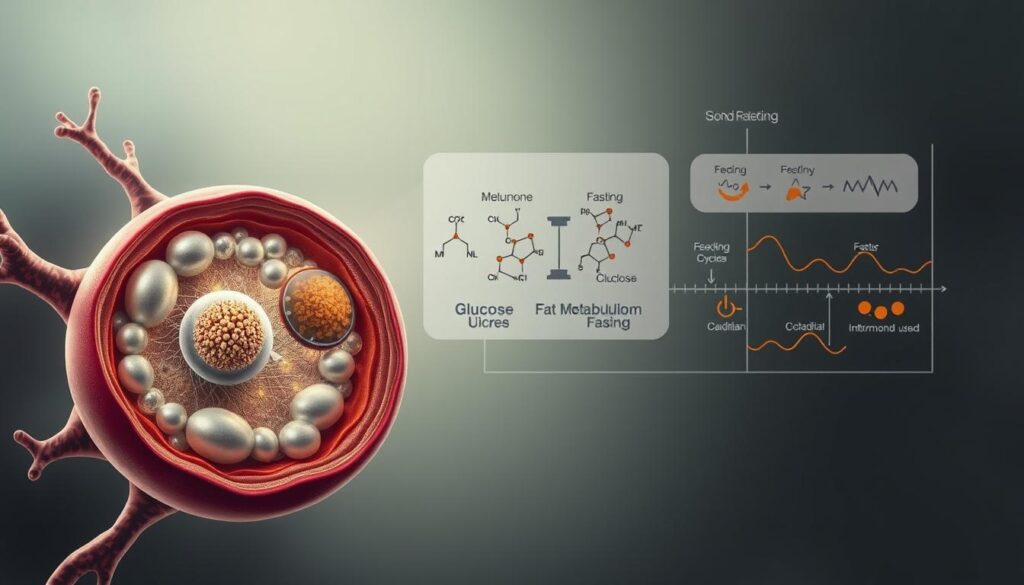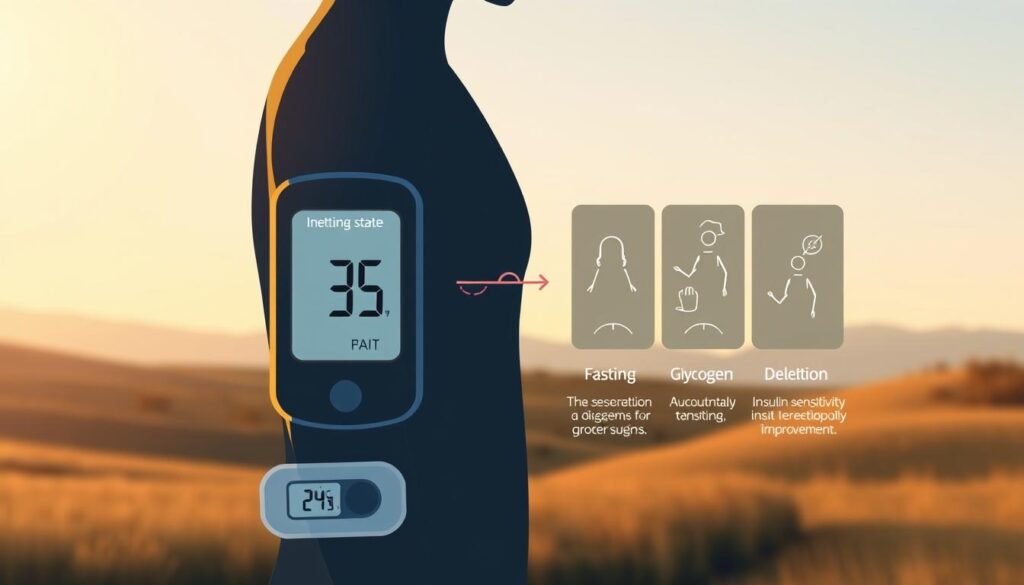Intermittent fasting has emerged as a popular eating pattern that alternates between periods of eating and fasting. It’s not just another diet trend; it’s a different approach to when you eat, rather than what you eat.
Research has shown that this eating pattern can lead to numerous potential health benefits beyond just weight loss. Historically, our ancestors often went long periods without food, and this pattern has roots in human evolution.
This article will explore the major advantages of intermittent fasting, including weight management, metabolic improvements, heart health, and cognitive benefits. Understanding how fasting affects the body can help readers decide if it’s right for them.
Key Takeaways
- Intermittent fasting is an eating pattern that switches between fasting and eating.
- Research shows numerous health benefits associated with intermittent fasting.
- It has historical roots in human evolution.
- Major benefits include weight management and metabolic improvements.
- Understanding its effects on the body can help readers decide if it’s right for them.
What Is Intermittent Fasting?
The concept of intermittent fasting revolves around alternating periods of eating and fasting to promote overall health. With intermittent fasting, you only eat during a specific time window.

The Concept of Eating Windows
Eating windows are designated periods when food consumption is allowed, while the remaining hours are reserved for fasting. These windows can range from 4 to 12 hours, depending on the specific intermittent fasting protocol. For example, you might choose to eat during an 8-hour window and fast for the remaining 16 hours of the day.
Fasting vs. Traditional Diets
Unlike traditional diets that focus on calorie restriction or eliminating certain food groups, intermittent fasting focuses on when you eat. It works with your body’s natural circadian rhythms and metabolic processes, making it a potentially sustainable lifestyle change. By restricting your eating to certain windows, you can simplify your diet and improve your overall health.
How Intermittent Fasting Works in Your Body
By restricting your eating window, intermittent fasting initiates a cascade of beneficial changes within your body. When you fast, your body undergoes a series of physiological responses that can lead to improved health.
Metabolic Switching
Intermittent fasting works by prolonging the period when your body has burned through the calories consumed during your last meal and begins burning fat. According to Mattson, after hours without food, the body exhausts its sugar stores and starts to burn fat, a process he refers to as metabolic switching. This transition from relying on glucose as the primary energy source to burning stored fat occurs when glycogen stores are depleted.

Hormonal Changes During Fasting
When you practice intermittent fasting, your insulin level drops significantly, which promotes fat burning and improves insulin sensitivity. Additionally, your blood level of human growth hormone (HGH) may increase dramatically, promoting fat burning and muscle gain. Other hormonal changes occur, including an increase in norepinephrine, which can boost metabolic rate.
- The body’s transition from glucose to fat as its primary energy source
- Significant drop in insulin levels during fasting periods
- Increase in human growth hormone (HGH) promoting fat burning and muscle preservation
These changes work together to create many of the health benefits associated with intermittent fasting.
Popular Intermittent Fasting Methods
Intermittent fasting encompasses various eating plans, catering to different lifestyles and goals. This flexibility is one of the reasons intermittent fasting has become so popular. By choosing a method that suits your needs, you can make fasting a sustainable part of your life.
16:8 Method
The 16:8 method, also known as time-restricted eating, involves fasting for 16 hours and eating during an 8-hour window each day. This approach is relatively easy to follow, as it often involves skipping breakfast and only eating between noon and 8 PM.
5:2 Approach
The 5:2 approach involves eating normally for five days of the week and restricting calories to 500-600 on the other two non-consecutive days. This method allows for more flexibility in terms of eating habits but still promotes calorie restriction.
Other Fasting Protocols
Other popular protocols include alternate-day fasting, the Warrior Diet (20:4), and extended fasting periods (24+ hours). Each method has different levels of intensity and may be suitable for different lifestyles and goals. Beginners might want to start with less restrictive approaches like 12:12 before progressing to more challenging protocols.

Weight Loss Benefits of Intermittent Fasting
The weight loss benefits of intermittent fasting are multifaceted and supported by research. Intermittent fasting involves restricting your eating window, which naturally leads to a reduction in calorie intake. This reduction occurs because you’re eating fewer meals, unless you significantly overeat during your designated eating periods.
Calorie Reduction Without Counting
One of the advantages of intermittent fasting is that it allows for weight loss without the need to count calories or track macronutrients. By limiting your eating window, you tend to consume fewer meals and snacks, creating a caloric deficit that is essential for weight loss. This approach simplifies the process of managing your weight.
Fat Burning and Metabolism Effects
Intermittent fasting not only reduces calorie intake but also enhances your body’s fat-burning capabilities. During fasting periods, your insulin levels decrease, while human growth hormone (HGH) and norepinephrine increase. These hormonal changes optimize your metabolism for fat loss. Research has shown that intermittent fasting can be more effective for weight loss than traditional calorie-restriction diets, with participants in a 2022 study losing an average of 9% of their body weight over 12 weeks.

Intermittent fasting may also help preserve muscle mass during weight loss and assist those who have struggled with weight loss plateaus. However, individual results can vary based on the specific fasting protocol followed.
Metabolic Health Improvements
Beyond weight loss, intermittent fasting offers significant benefits for metabolic health improvements. This eating pattern has been shown to have a positive impact on various metabolic health markers, enhancing overall health and reducing the risk of chronic diseases.
Blood Sugar and Insulin Sensitivity
Intermittent fasting helps lower blood sugar levels by reducing insulin resistance and improving insulin sensitivity. During fasting periods, the body’s cells become more responsive to insulin, making it easier to regulate blood sugar levels. This improvement in insulin sensitivity can be particularly beneficial for individuals at risk of developing type 2 diabetes.

Potential Benefits for Type 2 Diabetes
Research on intermittent fasting has shown promising results for individuals with type 2 diabetes. Studies have indicated that this eating pattern can lead to reduced fasting glucose levels and improved HbA1c, a long-term measure of blood sugar control. Some individuals with type 2 diabetes may be able to reduce their medication needs under medical supervision. However, it’s crucial for anyone with diabetes to consult with their healthcare provider before starting intermittent fasting.
In conclusion, the metabolic health improvements associated with intermittent fasting can occur even without significant weight loss, highlighting the potential benefits of this eating pattern for overall health and diabetes management.
Heart and Cardiovascular Benefits
By incorporating intermittent fasting into one’s lifestyle, individuals may experience improvements in heart health and a reduced risk of cardiovascular disease. Intermittent fasting has been shown to improve several risk factors for heart disease, including blood sugar levels, blood pressure, and cholesterol levels.
Effects on Blood Pressure and Cholesterol
Studies have found that intermittent fasting can lead to significant reductions in blood pressure in both hypertensive and normotensive individuals. Additionally, fasting periods can improve lipid profiles by lowering total cholesterol, LDL (“bad”) cholesterol, and triglycerides, while potentially increasing HDL (“good”) cholesterol. This can lead to a reduced risk of heart disease and stroke.
Reducing Inflammation
Intermittent fasting has anti-inflammatory effects, which can protect blood vessels and heart tissue. Reduced inflammation is associated with a lower risk of heart disease, and intermittent fasting may help mitigate this risk. As Dr. Mark Mattson, a renowned neuroscientist, notes, “Intermittent fasting can lead to a reduction in oxidative stress and inflammation, which are key factors in the development of cardiovascular disease.”
Overall, the cardiovascular benefits of intermittent fasting can occur independently of weight loss, and may potentially reduce reliance on medications for conditions like hypertension and high cholesterol.
Brain Health and Cognitive Function
Research into intermittent fasting reveals its potential to enhance brain health through several key mechanisms. As we explore the intricacies of how intermittent fasting affects the brain, it becomes clear that this dietary approach influences cognitive function and neurological well-being in multiple ways.
Cellular Repair and Autophagy
When you fast, the cells in your body initiate a natural process called autophagy, a cellular “self-cleaning” mechanism that breaks down and recycles damaged or dysfunctional proteins and organelles. This process is crucial for maintaining cellular health, particularly in the brain, where it may help remove proteins associated with neurodegenerative diseases. Autophagy is a vital process that supports overall brain health by clearing out cellular debris that could otherwise lead to cellular dysfunction.
Potential Protection Against Neurodegenerative Diseases
Intermittent fasting has been shown to increase production of brain-derived neurotrophic factor (BDNF), a protein that plays a significant role in the growth and maintenance of healthy neurons. Increased BDNF levels are associated with improved cognitive function and a reduced risk of neurodegenerative diseases. Research suggests that intermittent fasting may offer protection against conditions such as Alzheimer’s and Parkinson’s disease by enhancing cellular cleaning processes and improving metabolic health.
The metabolic improvements associated with intermittent fasting also benefit brain function, as the brain is highly dependent on stable blood sugar levels and efficient metabolism. By reducing inflammation and improving insulin sensitivity, intermittent fasting creates a more favorable environment for brain health. Additionally, studies have shown potential cognitive benefits, including improved memory, focus, and mental clarity during fasting states.
From an evolutionary perspective, it’s suggested that our brains may function optimally with periodic food restriction, similar to our ancestors’ eating patterns. This perspective supports the idea that intermittent fasting could be a natural and effective way to support brain health and cognitive function.
Who Should Avoid Intermittent Fasting
While intermittent fasting can be beneficial for many, there are certain groups of people who should exercise caution or avoid it altogether. Before starting any fasting regimen, it’s crucial to consult with a healthcare provider, especially for individuals with pre-existing health conditions.
Medical Conditions and Medications
People with certain medical conditions should be cautious about adopting intermittent fasting. For instance, individuals with type 1 diabetes who take insulin, those with a history of eating disorders, or people with low blood pressure may face adverse effects. Additionally, individuals on medications that need to be taken with food or affect blood sugar levels should consult their doctor before fasting.
Age and Life Stage Considerations
Certain life stages or age groups may need to avoid or modify intermittent fasting protocols. Children and teenagers under 18, pregnant or breastfeeding women, and potentially older adults may have different nutritional needs or face risks associated with fasting. For example, pregnant women have higher nutritional demands, and fasting could potentially deprive the fetus of necessary nutrients.
As emphasized by health professionals, it’s vital for individuals, especially those with health concerns, to discuss their plans with a doctor before initiating any form of intermittent fasting. This precaution can help prevent potential health complications.
Conclusion: Is Intermittent Fasting Right for You?
As we’ve explored throughout this article, intermittent fasting offers a multitude of benefits for overall health and wellbeing. From weight management and metabolic health improvements to enhanced heart health and cognitive function, the advantages are numerous.
However, it’s crucial to remember that intermittent fasting is not a one-size-fits-all approach. Different methods work better for different people, and it’s essential to choose a fasting schedule that suits your lifestyle. Starting with a less restrictive fasting schedule, such as 12:12 or 14:10, can be a good starting point.
Before beginning any intermittent fasting regimen, especially if you have existing health conditions, it’s recommended to consult with a healthcare provider. By doing so, you can harness the benefits of fasting while ensuring your safety and wellbeing.
